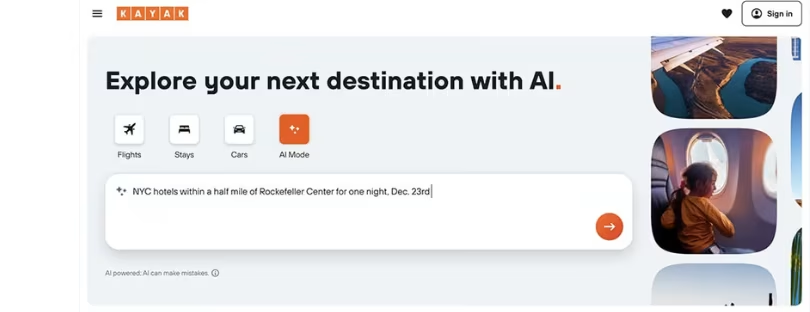
Kayak Launches “AI Mode” — A Conversational Leap in AI Travel Search
Kayak is doubling down on artificial intelligence with the launch of “AI Mode,” a new tool that lets travelers search for flights, hotels, and rentals using natural, human-like language.
The feature, now live on both desktop and mobile browsers, merges Kayak’s massive travel data engine with OpenAI’s ChatGPT, turning traditional keyword-based travel searches into smooth, conversational exchanges. Instead of filling in multiple fields, users can now simply type questions like “Where can I fly this weekend for under €200?” or “Find me a boutique hotel in Lisbon with a rooftop pool.”
The system then scans Kayak’s partners, compares prices, and delivers real-time results across travel providers, allowing travelers to book everything — flights, stays, and rentals — “all in one place.”
From Kayak.ai to AI Mode — A Quick Graduation
This isn’t Kayak’s first AI experiment. Earlier this year, the company quietly launched Kayak.ai, described as a “test lab” for AI-first features aimed at making the travel experience more personalized and conversational.
According to Kayak CEO Steve Hafner, AI Mode represents the first major success story from that lab:
“We launched Kayak.ai in April for our engineers to test cutting-edge AI capabilities. AI Mode is the first feature to graduate to our main site. Travelers aren’t limited to preset entry fields anymore — just tell us what you’re looking for in plain language, and we’ll answer the same way.”
The announcement follows previous AI-driven features like Kayak Price Check and Ask Kayak, both designed to simplify trip planning through predictive and conversational technologies.
How Kayak’s Move Fits into the AI Travel Trend
Kayak isn’t alone in this race. Expedia, Booking.com, and Trip.com have all rolled out their own AI assistants powered by large language models. Expedia’s “AI Travel Assistant,” for instance, helps users build trips through chat-based planning, while Booking.com’s “AI Trip Planner” offers destination recommendations and itinerary generation.
What makes Kayak’s approach stand out is its focus on direct integration within its main platform, rather than keeping AI tools as side experiments. With “AI Mode” now part of the core Kayak experience, the company is signaling that conversational travel search isn’t just an experiment — it’s the new interface.
Still, the challenge remains: travelers often crave trust and context as much as convenience. As AI tools evolve, their success will depend on transparency, pricing accuracy, and personalization — areas that still see hiccups across the industry.
Conclusion: AI Is Rewriting the Search Box
Kayak’s “AI Mode” marks another step toward a future where planning a trip feels more like chatting than searching. The big shift here isn’t just about AI — it’s about user behavior. People are increasingly comfortable using conversational interfaces, from ChatGPT to voice assistants, and travel companies are racing to adapt.
Kayak’s advantage lies in its data depth and meta-search DNA, which give its AI answers a real-time edge. But as competition heats up—with Booking, Google Travel, and Expedia all refining their own generative AI assistants—the real winners will be those who combine AI fluency with genuine reliability and local nuance.
For now, Kayak’s “AI Mode” is a smart, user-friendly leap forward—one that brings the promise of truly conversational travel planning closer to reality.










